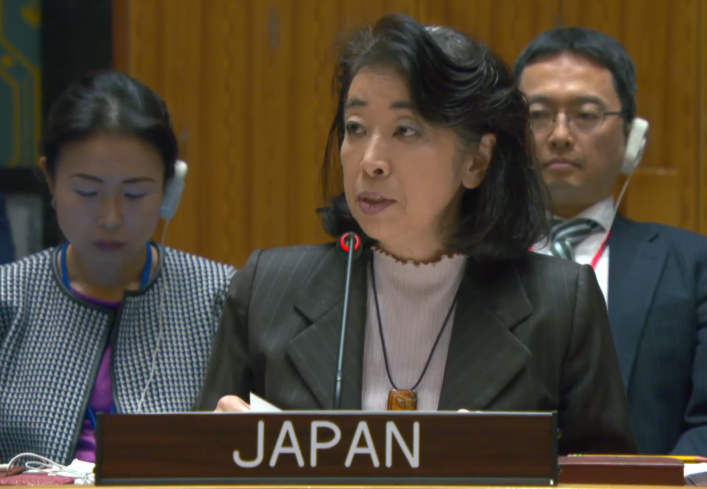Statement by H.E. Ambassador SHINO Mitsuko, Deputy Permanent Representative of Japan to the United Nations, United Nations Security Council Open Debate on “Women’s participation in international peace and security: From theory to practice”
2023/10/25

(As delivered)
Thank you, Mr. President.
I thank Brazil for convening this important Open Debate focusing on women’s participation in international peace and security, especially thanking His Excellency Minister Vieira, for your chairing of this debate. I also thank the Secretary-General, UN Women Executive Director, and all other briefers for their comprehensive briefings.
As a member of the WPS Shared Commitments, Japan is committed to amplifying women’s voices and following up on the recommendations of civil society presented to the Security Council. On our part, at the Open Debate on Peacebuilding during the presidency in January this year, Japan invited Ms. Diago Ndiaye, President of the Network on Peace and Security for Women in the ECOWAS region. I am thankful for her several practical recommendations to the Council, some of which I would like to now highlight.
Her recommendations include the following: First, there is a call to invest in people, with a specific focus on women and girls, to ensure societal inclusivity, which will lead to building resilient and effective institutions. Second, governments are urged to prioritize the development of community infrastructure and provision of basic necessities to address the needs of vulnerable populations. Lastly, her recommendations stress the importance of addressing issues such as health emergencies, economic stability, and food security.
These suggestions clearly underline the importance of meeting the basic needs of women and girls to tackle the root causes of their under-representation and exclusion in matters of peace and security. This aligns with Japan’s long-standing holistic approach in international cooperation aimed at advancing gender equality and empowering women and girls in various areas, including education, health, economic empowerment, human rights, leadership, norms and legislations globally. Japan is committed to these efforts.
Mr. President,
At the national level, WPS National Action Plans should serve as a comprehensive tool for tracking actions and implementations based on relevant Security Council resolutions on women, peace and security, especially on participation. I am pleased with the growing number of Member States adopting the plan, and most of them entail a monitoring framework as highlighted in the latest Secretary-General’s report. The Security Council should continue to encourage Member States to adopt and implement a National Action Plan to comply with relevant Council resolutions.
Furthermore, participation constitutes the first key component of Japan’s third and current National Action Plan, which was formulated in close consultation with CSOs and the broader public. I would also like to highlight that this current Action Plan especially acknowledges the importance of providing support to gender-based and conflict-related sexual violence survivors, encompassing individuals of all genders and sexual minorities.
Mr. President,
As I mentioned earlier, women’s participation in peace and security requires a holistic approach, and this applies to each Member State’s nation-wide efforts. Japan has promoted women’s access to leadership positions in political institutions as well as in justice, security and defense institutions through the government-wide five-year basic plan for gender equality, with numerical targets. The relevant government departments and agencies monitor the progress and take actions to bridge any gaps.
Regionally, together with Viet Nam, Japan has been co-chairing the PKO Experts’ Working Group of the ASEAN Defence Ministers’ Meeting Plus, a platform for ASEAN and its eight Dialogue Partners. The co-chairs have established a WPS platform under this group, and through the sharing of good practices and inviting eminent experts, contributed to raising awareness of the WPS agenda, including the importance of meaningful participation of female peacekeepers for effective operations.
Finally, Mr. President, I would like to share that in September, Ms. KAMIKAWA Yoko assumed the post of Minister for Foreign Affairs of Japan. She has worked extensively on the promotion of the WPS agenda even before she became Foreign Minister, and she established a parliamentary league on WPS in Japan last year. Under her leadership, we will continue to make our utmost efforts to realize women’s full, equal, and meaningful participation and leadership in peace processes together with all stakeholders.
I thank you.
